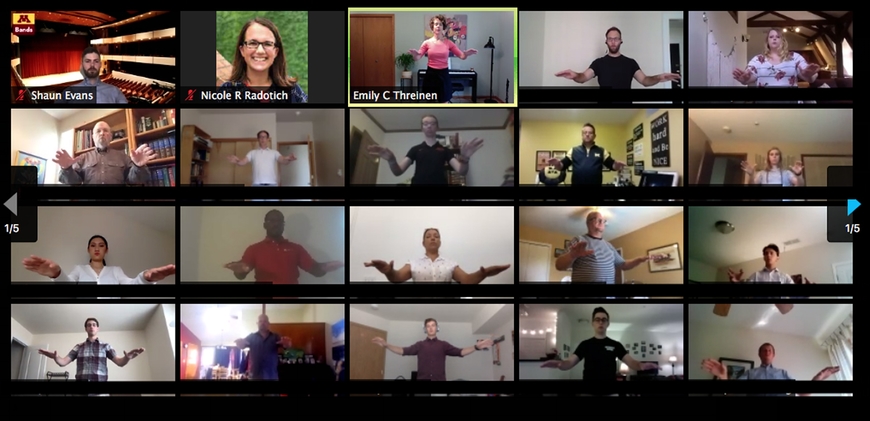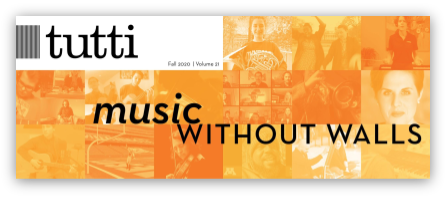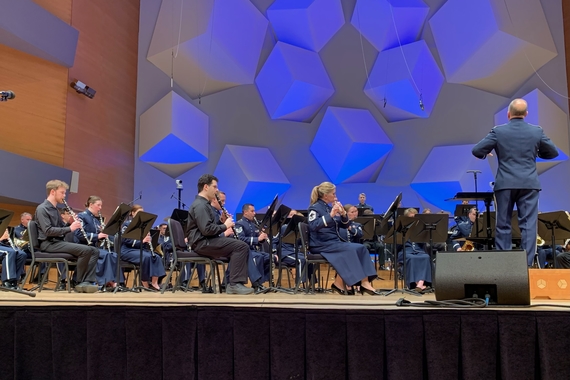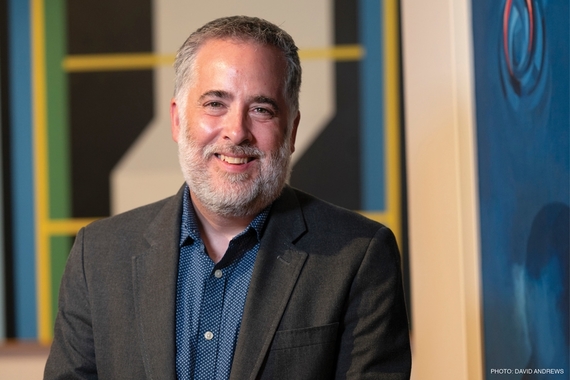Innovating New Methods of Instruction in an Unprecedented Time
An annual summer tradition for music educators from Minnesota and beyond, the Wind Band Conducting Workshop experience is soundly intertwined with its location. Participants stay in student dorms, lunch at local restaurants on the West Bank, and spend afternoons on the Ted Mann Concert Hall stage, taking turns conducting pieces like Lincolnshire Posy by Percy Grainger or Sheltering Sky by John Mackey. Emily Threinen, Director of Bands, faced a challenge when COVID-19 prevented an in-person event this year. How could a workshop which traditionally depends on the nuance of personal instruction, focused on something as delicate as baton movement, adapt to a virtual format?
The switch to online instruction for the workshop was decided months before the scheduled event to give music educators the chance to rearrange their schedule for virtual instruction. In early April, College of Liberal Arts Dean John Coleman sent an email asking the community to prepare for the cancellation of non-credit summer activities, and invited the substitution of “creative alternatives.” Ensemble Program Manager and Virtual Summit organizer, Nicole Radotich recalls: “I read Dean Coleman’s message and the phrase ‘creative alternatives’ caught my eye. Before that, we had been thinking the workshop would either be hosted in-person or canceled. I asked Dr. Threinen, ‘can we offer a workshop online?’ We quickly decided, ‘Yes. We can do this!’” The Wind Band Conductor and Educator Virtual Summit was born.
While the shift caused rescheduling challenges, it also presented unexpected opportunities for the workshop to expand beyond the traditional format. One limitation that changed was class size. With virtual instruction, there was no travel involved for participation, leading to almost double the number of registrants over last year. Travel restrictions disappeared as a barrier in recruiting presenters resulting in a wider variety and greater number of experienced faculty joining the roster. The lack of travel also opened the doors for attendees. In 2019, attendees came from 12 U.S. states and two Canadian provinces. This year, attendees came from 34 U.S. states and three countries, including Taiwan.
Early on, it was clear the online summit would not be the same as a conducting workshop because so much of the in-person time is spent conducting in front of a large ensemble. As much as possible, the team worked to create an engaging online event. Sessions included movement and conducting exercises so that participants were not just sitting and looking at a screen all day.
A particularly moving session from Musicology Professor Peter Mercer-Taylor (Music and Catastrophe: Historical Perspectives), a classical scholar who was new to the band world, focused on instrumental ensemble responses to national and international crises. “What he created was a wonderfully emotional retrospective, highlighting impactful events through compositions in the field of band music with a focus on American history,” shared Threinen “It is a thoughtful video that impacted me deeply.”
Participants appreciated the adapted workshop in the current climate and found unexpected inspiration for their fall instruction. Matt Collins, a public school band director from Massachusetts, reflected, “This summit took into account the difficult social and health challenges we are currently facing in such a human way. I have a much better idea of how I can approach my classroom this fall with an important perspective on diversity, equity, inclusion, mental health, and helping the human beings behind the instrument.”
“I didn't think a virtual webinar could be this engaging or inspiring. The UMN Virtual Summit has motivated me to tackle what is sure to be a challenging year with newfound confidence,” shared Mitch Evett, a high school band director from California.
Threinen felt a connection with the participants and thought the passion of the presenters was stronger. “We all know that it is important to learn about our students and those we work with, but we don't always have the opportunity to do so with time constraints in rehearsals and classrooms,” Threinen observed. “What I have taken away from the pandemic, and through the Virtual Summit, are new ways to get to know our students and participants through opportunities to share their voices and points of view, before the event, rehearsal, or class begins. We all teach better when we know more about our audience.”
Tutti. (Italian) all. every musician to take part.
Tutti is the annual publication of the University of Minnesota School of Music.




